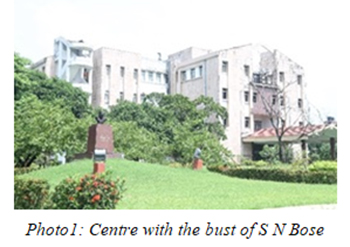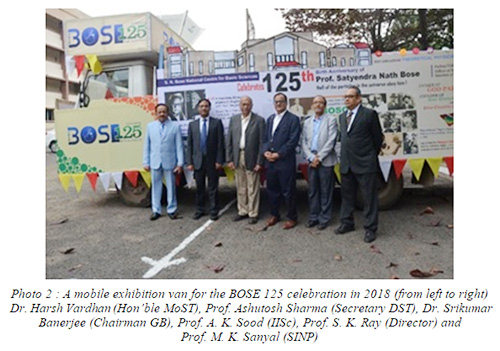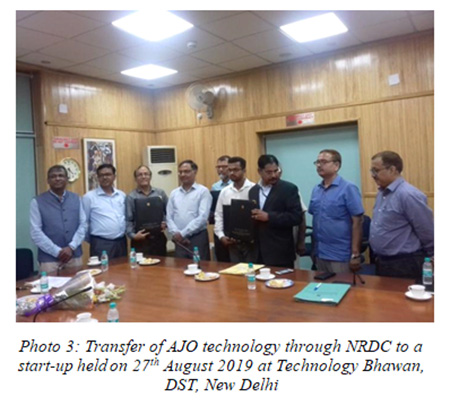 Satyendra Nath Bose National Centre for Basic Sciences (SNBNCBS) undertakes cutting edge research in chosen areas of basic sciences, including areas of application potentials and national needs. The centre has made notable research progress in the areas of Computational Materials Science, Quantum Science & Technology, Quantum Field Theory, Gravitational Physics, Statistical Physics, and Theoretical & Observational Astronomy, Ultrafast Spectroscopy, Advanced Materials including nanomaterials, soft and biomaterials in recent years.
Satyendra Nath Bose National Centre for Basic Sciences (SNBNCBS) undertakes cutting edge research in chosen areas of basic sciences, including areas of application potentials and national needs. The centre has made notable research progress in the areas of Computational Materials Science, Quantum Science & Technology, Quantum Field Theory, Gravitational Physics, Statistical Physics, and Theoretical & Observational Astronomy, Ultrafast Spectroscopy, Advanced Materials including nanomaterials, soft and biomaterials in recent years.
Over the last decade, the Centre has transformed itself from an institution with most activities in theoretical and computational areas to an institution with a balance of theory, computer simulation, and modern experimentation. In the recent past, the Centre has been very active in translational research for the transfer of research outputs for societal benefits, with strong relevance to the National Health Mission. Through the Technical Research Centre (TRC), it has created an eco-system for Make in India initiative in the country by harnessing science and technology platforms, and so far it has transferred six technologies, with five of them already launched commercially including an Active Respirator Face Mask (Bose-shield) and a Nano-sanitizer with a Dispensing Antimicrobial Layer (Bosetizer) to combat COVID-19 pandemic.
 At present, R&D activities in the Centre, established in 1986 to honor the life and works of the legendary physicist, are carried out in four departments, viz., (i) Astrophysics and Cosmology, (ii) Chemical, Biological, and Macromolecular Sciences, (iii) Condensed Matter Physics & Material Sciences, and (iv) Theoretical Sciences. The Centre has successfully completed several thematic units established by Department of Science & Technology (DST) in the area of Nanoscience and Computational Materials Science with major extramural funding in these areas. Based on the research publications in the year 2019-20, the Centre is now among the top three DST institutes as per the Nature Index ranking based on the quality of publications. Scientists are involved in several National and Global research collaborations and have undertaken 27 Sponsored Research Projects with a total grant of INR 14.15 crores in the year 2019-20.
At present, R&D activities in the Centre, established in 1986 to honor the life and works of the legendary physicist, are carried out in four departments, viz., (i) Astrophysics and Cosmology, (ii) Chemical, Biological, and Macromolecular Sciences, (iii) Condensed Matter Physics & Material Sciences, and (iv) Theoretical Sciences. The Centre has successfully completed several thematic units established by Department of Science & Technology (DST) in the area of Nanoscience and Computational Materials Science with major extramural funding in these areas. Based on the research publications in the year 2019-20, the Centre is now among the top three DST institutes as per the Nature Index ranking based on the quality of publications. Scientists are involved in several National and Global research collaborations and have undertaken 27 Sponsored Research Projects with a total grant of INR 14.15 crores in the year 2019-20.
The Centre houses state of the art research facilities such as high-performance computing, advanced facilities for materials synthesis and characterization at the nanoscopic level, and cleanroom facilities for nanolithography and nanofabrication with features down to 20 nm. The Centre also has advanced experimental facilities at low temperatures with high magnetic  field, ultrafast and high-frequency spectroscopy including femtosecond systems, time-resolved MOKE, cavity ring-down and Tera-Hertz Spectroscopy.
field, ultrafast and high-frequency spectroscopy including femtosecond systems, time-resolved MOKE, cavity ring-down and Tera-Hertz Spectroscopy.
Human Resource Development is a key mandate of the Centre. The institute has thrived for excellence in research and training high-quality scientific manpower through sustainable academic programs. With current core strength of 30 regular faculty members, the Centre undertakes manpower training of around 160 doctoral students, 20 Integrated M.Sc.-Ph.D. students and 30 post-doctoral researchers. More than 20 specialized semester courses are offered each year, and additional training schools and workshops are organized for external students, including summer projects for joint-academy funded scholars. The institute organizes various outreach activities such as lectures, workshops, and training schools, colleges and universities spread across the country and are the DST nodal Centre for Theoretical Physics Seminar Circuit (TPSC). During Bose-125 celebrations in the year 2018, the curtain-raiser ceremony of which was inaugurated by the Honorable Prime Minister through video conference, the Centre conducted more than 125 Science outreach programs across the nation to inspire the young generation in Science & Technology.






























